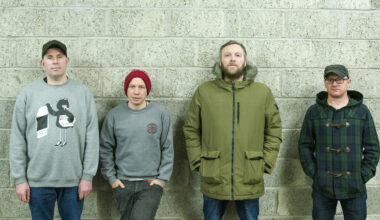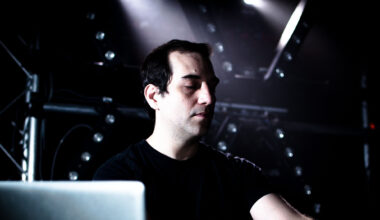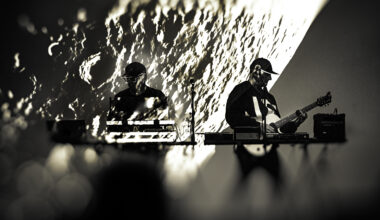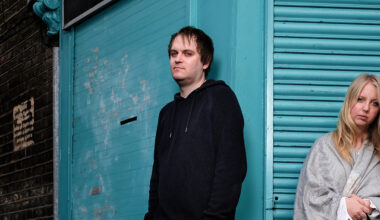He’s just released his first album in 14 years and it’s a tech noir corker, black to the core and all the way back. Dave Clarke talks gothic electronica, punk rock, silver cables, Lego guitars, porcupines, hedgehogs, Suzi Quatro and Department S. Say, is Vic there?
Off the top of your head, without thinking about it too much, what five words do you think best describe you?
“Honest. Passionate. Uncompromising.”
Dave Clarke pauses, but not for long.
“Integrity. I’d like to think I’m someone that has integrity.”
Four down, one to go.
“Difficult,” he says. “I can’t deny that. I know I can be difficult.”
It takes Dave Clarke less than 15 seconds to answer my opening question. Easily less than 15 seconds. But it takes him more than 15 minutes to answer my next one, which centres on the fact that he’s released just three studio albums and a 12-inch, ‘I Like John’ (on XL under the name Hardcore), over the course of a recording career that goes right back to 1990. What on earth has he been doing?
In his response, Clarke jumps from one subject to another, talking about his DJing, his studio, the different hardware and software he’s used over the years, how he struggles to begin work on a new track (“I fucking hate starting tracks. I will procrastinate my arse off”) and his move from the UK to Amsterdam, where he has lived for the last decade. He talks about his OCD too.
“My OCD can get ridiculous,” he reveals. “But aside from when I clean the house, the only place I allow it to come through is in the studio, or when it’s something connected to the studio. There was one time when I wanted some new cables, so I spoke to a few different cable manufacturers, and I ended up going to Japan to buy these cables that were made out of medical grade silver. But then on the plane on the way back, I couldn’t stop thinking about one particular cable. I couldn’t sleep, I couldn’t eat, I couldn’t think about anything else but this cable. Just this one cable. So, yeah, it can be that ridiculous.”
There’s tons of interesting stuff in his lengthy and rambling answer, some of which we might return to later on. For now, what’s perhaps most telling is not what Clarke says, it’s how he says it. I first met him in the mid-1990s and our paths have crossed several times since, and I know he can sometimes be a bit sullen and a bit prickly. You don’t see many pictures of him smiling. Today, however, he’s visibly relaxed. He’s chatty and he’s cheery. He’s not at all difficult. Not yet anyway.
Dave Clarke’s recently released third album is called ‘The Desecration Of Desire’ and it comes 14 years on from ‘Devil’s Advocate’ and 22 years after his ‘Archive One’ debut. The latter included several cuts taken from his acclaimed ‘Red’ series; three 12-inch singles that stand as shining examples of first generation UK techno, particularly the simultaneously euphoric and malevolent ‘Wisdom To The Wise’ from ‘Red 2’. John Peel was an early supporter of Clarke’s work, dubbing the young Brighton producer and DJ The Baron Of Techno, a name that has stuck with him to this day.
But despite the accolades heaped on both ‘Archive One’ and ‘Devil’s Advocate’ at the time of their release, Clarke is quite dismissive of both records now. He says he views them as collections of tracks rather than as purposely designed and fully-rounded albums in their own right.
“Half the tracks on ‘Archive One’ were on the ‘Red’ singles and the rest were quite underdeveloped,” he notes. “‘Devil’s Advocate’ was a more mature record and I’m happy with some of the stuff on there, like the stuff with Chicks On Speed, but it still wasn’t where I wanted it to be. David Bowie once said that, as an artist, you should always be uncomfortable. Well, I don’t know about that, but you certainly shouldn’t be comfortable either, and I think what happened with ‘Devil’s Advocate’ was I ended up doing a sort of pastiche of myself.
“It feels very different with ‘The Desecration Of Desire’. To me, this is my first proper album. When I started, I decided I wanted to write it as if it was a book, writing everything in order, writing tracks like they were chapters. So once I committed to a track and it was going to be track three, then track three was what it was.
And then once that was done, I’d think about how track three ended to help me come up with an idea for track four. I wanted everything to flow, everything to be in the right place. I realised how important that was after seeing a documentary about Carole King’s ‘Tapestry’ and how they spent six months working on the running order of the album, because having all those beautiful songs on there wasn’t enough.”
For some people, the people who only know Clarke for his ‘Red’ slates or the fact that he’s been one of the most sought-after techno DJs in the world, playing to massive audiences across the globe pretty much every weekend, ‘The Desecration Of Desire’ will come as a surprise. For one thing, it’s not a techno record. Not as most folk would define it.
“No, it isn’t techno,” agrees Clarke. “I expect there’ll be a lot of people going, ‘Hang on, where’s the techno? What the hell’s going on here?’.”

The sound throughout is crunchy and heavy and dark. Pitch black, in fact. Exquisitely so. I remind Clarke that he used the phrase “gothic electronica” to describe a remix he did of The Neon Judgement a couple of years ago. Is this more gothic electronica, then?
“Sort of. The other phrase that I’ve used on a few tweets is ‘tech noir’. It doesn’t have anything to do with the film genre, the original ‘Blade Runner’ and things like that, but this music is obviously based on technology and it is dark, it is gothic, it is grungy, if I dare use that word. Of course, I hope that it doesn’t fit into any category at all, but every artist says crap like that, don’t they? All I know is that it’s just me and I feel comfortable with what it represents. But if we are going to put a label on it, then I think tech noir makes a lot of sense.”
If you’ve been paying attention to Clarke’s career, you’ll be aware that his musical interests have always stretched far beyond techno. He’s a lifelong fan of punk and post-punk music, which is why Hardcore’s ‘I Like John’ sampled PiL’s ‘This Is Not A Love Song’ and why he borrowed heavily from Bauhaus’ ‘She’s In Parties’ for ‘What Was Her Name?’ on ‘Devil’s Advocate’. When it comes to remixes, his credits includes Placebo, I Am Kloot and The Amazing Snakeheads, as well as the likes of New Order, Depeche Mode and John Foxx. When it comes to his DJ sets, keep your ears open for Devo, DAF, The Sisters Of Mercy, Talking Heads, Rammstein and even The Knack alongside the newest tunes in his box.
All of which leads us back to ‘The Desecration Of Desire’. One of the highlights of the album is a startling cover of ‘Is Vic There?’, a one-off hit for Department S in 1981. The vocals are by Louisahhh, the hotly tipped New York-born, Paris-based producer and DJ. It turns out that Louisahhh is rather partial to the old new wave herself.
“The funny thing was, I’d totally forgotten about ‘Is Vic There?’,” says Clarke. “I have all my classics on my iPod, but I also have lots of vinyl records from when I was growing up, and this was one of those. I heard it out of the blue while I was in the studio one day preparing to begin work on the album. I got goosebumps straight away and I remembered being entranced by it as a kid. I saw Department S play it on ’Top Of The Pops’ and I was blown away by how weird it was. I probably danced around in front of the telly waving a guitar I’d made out of Lego. I usually did that when ’Top Of The Pops’ was on. And then, much to the chagrin of my parents, I’d smash the guitar up on the ceramic fireplace.
“So anyway, I decided to do a cover of ‘Is Vic There?’, but I didn’t take the music, I just took the lyrics. I’d spent some time with Louisahhh in Paris, going to museums and hanging out, and I’d worked with her on a few things before, I thought she’d be great for it. I wanted her to talk the words, not sing them, and her voice was perfect for it. She has a really sassy voice, sassy in the way that I always thought Suzi Quatro’s voice was.
Whenever I hear Suzi Quatro sing or talk, I always think, ’She’s cool, she’s smart, very independent, very secure’, and it makes me want to latch on to her because of that. And I get the same vibe from Louisahhh’s voice. It was really quick to record the song with her too. Three or four takes and we were done.”
There are several other noteworthy contributors to ‘The Desecration Of Desire’, including Gazelle Twin, Keith Tenniswood from Two Lone Swordsmen, and Madonna remixer Mt Sims. The most noteworthy is perhaps gritty crooner Mark Lanegan of Screaming Trees, and Queens Of The Stone Age fame. Lanegan appears on two tracks, ‘Charcoal Eyes (Glass Tears)’ and ‘Monochrome Sun’, the former featuring tiny fragments of lyrics from the likes of Joy Division, Patti Smith, The Adverts and the Au Pairs.
“It was fun to throw those little references in there, things that old farts like you and me will pick up on,” grins Clarke.
The two Lanegan cuts sit side-by-side and form a pivotal point for the whole album. ‘Charcoal Eyes’ is a relentlessly building dystopian trip, while the brooding ‘Monochrome Sun’ is up there with the awesome ‘Black River’, a song Lanegan recorded with Tim Simenon from Bomb The Bass this time last decade.
“I’ve always loved Mark’s vocals and I knew he’d worked with Tim, so I dropped him a quick email and I got an instant reply,” says Clarke. “I sent him the two tracks, just instrumentals, rough sketches, but again he came back to me quickly. He said, ‘Oh, I love those, I really feel we can do something. Do you have any lyrics you can send me?’. This was the crunch for me. So I sent him what I’d got and I have to say I was feeling very exposed at this point. He responded with something like, ‘Hey brother, they’re really strong’. And I was like, ‘Fuck, they’re the first lyrics I’ve ever written’. And he said, ‘Well, they’re good’. I was delighted by that. He came over to Amsterdam to start recording with me about 10 days later.”
Whatever you want to call it, tech noir or gothic electronica, or something else, ‘The Desecration Of Desire’ is a triumph on all sorts of different levels for Dave Clarke. I reckon it’s a terrific record. It’s coming in late, but it’s a very strong contender for my favourite album of 2017.
It’s unlikely to satisfy Clarke’s most vociferous detractors, though. The scores of people who contributed to the “What’s wrong with Dave Clarke?” discussion group on Discogs a few years ago, for example. We’re talking fuckwitted internet trolls here, of course, but it’s interesting that a recurring complaint about him is that he’s grumpy and spiky. Which, as I said, he sometimes is. He’s apparently arrogant too.
“I think I can be perceived as arrogant,” he says. “On the other hand, I’ve never had any desire to be famous and I think I am also quite self-effacing. I have a dry sense of humour, so if I say something like, ‘Well, X and Y happened and that’s obviously because I’m an incredible talent’, that would be tongue-in-cheek in a massive, massive, massive way. I don’t believe that about myself at all. But my delivery is very flat – as well as The Baron Of Techno, I’ve also been called The Jack Dee Of Techno – and if you’re not attuned to that or my sense of humour, you could get hold of the wrong end of the stick.
“The porcupine thing, the hedgehog thing, yes, that is there with me. It’s a defence mechanism. I can be introspective, but I think most artists can be. I’m not introspective when I’m in a comfortable environment or I’m with my friends, but it does take me a while to warm to people. The flip side of that is you might never warm to some people because you’re being hedgehoggy and porcupiney, because you’ve already put your spikes out, so you’re asking them to have to try harder with you, which isn’t really very fair.”
I guess we’re edging into “Difficult” Dave territory here. As it goes, on the occasions I’ve spent some time with him, I can’t recall a single instance when I didn’t enjoy his company. In fact, I’d say that he’s one of the most intriguing characters in electronic music. What I like best about him is he’s not afraid to be who he is, whatever anyone might think about that, and he never makes any attempt to be anything other than who he is.
“I sometimes wish I could bring it down a notch, be a bit more nonchalant, but I can’t. Honesty has been a very tricky thing for me throughout the whole of my life. I’m not diplomatic, I’m not clever about that, and I can be brutal. I will talk about the elephant in the room. It’s got me into trouble over the years, but I still do it. And I’m too long in the tooth to change now. Of all the things that are important to me, honesty comes first. Honesty is imperative.”
‘The Desecration Of Desire’ is out on Skint






